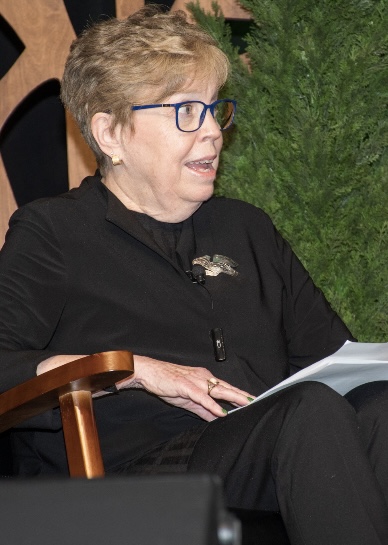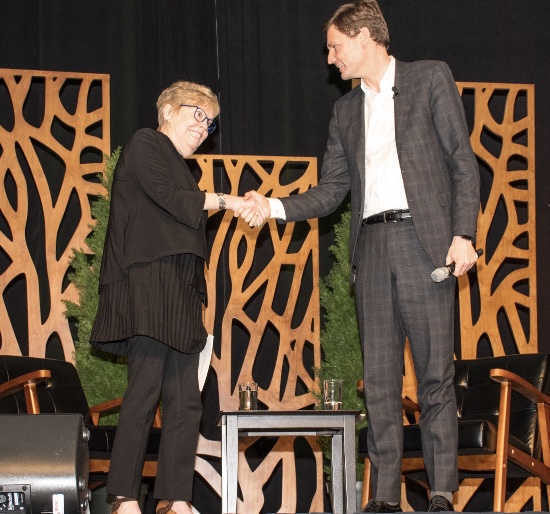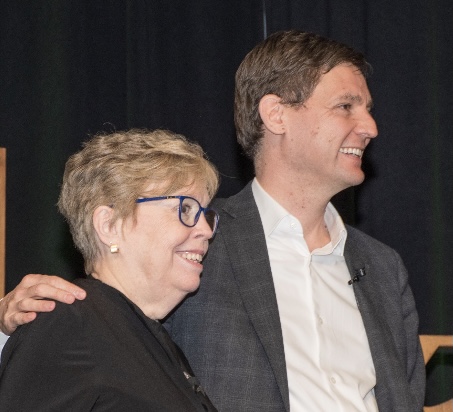BC Premier Eby and COFI CEO Linda Coady wrap up the 2023 Council of Forest Industries Conference with the following Q&A [lightly edited for clarity]:
 COADY: For our final session today and at this convention we are very pleased to welcome BC Premier David Eby. Premier, first of all, thank you for being “in the room” with us today. Because as Lenny Joe from the First Nations Forestry Council observed earlier this morning, being in the room is essential to building the trust and collaboration required to move the BC forest sector forward at this time.
COADY: For our final session today and at this convention we are very pleased to welcome BC Premier David Eby. Premier, first of all, thank you for being “in the room” with us today. Because as Lenny Joe from the First Nations Forestry Council observed earlier this morning, being in the room is essential to building the trust and collaboration required to move the BC forest sector forward at this time.
I know it is tradition that the Premier attends the annual COFI convention. But as you have only been in the office for a few months … and no doubt have a number of competing priorities on your desk … you have choices to make, so we are glad you made this one.
We also appreciate the fact that Forests Minister Bruce Ralston and Water, Land, and Resource Stewardship Minister Nathan Cullen have spent the last couple of days at the convention as well and have similarly been in meetings with a wide range of stakeholders while they are here. It’s been five months since you were sworn in. When you first took office you put a couple of seemingly simple yet powerful goals out there that everyone could relate to. You said you wanted to: make sure everyone had a family doctor; make housing more affordable; and improve the situation in BC cities and towns on crime and mental health.
In your remarks just now, you also talked about your government’s work with and priorities for the forest sector in BC. A sector currently in the midst of a lot of change – and arguably having an “Everything, Everywhere All at Once” kind of moment. But one that you still see as foundational to the social, economic and environmental well-being of many regional communities in BC as well as the province as a whole. So, let’s also look at some of the seemingly simple yet powerful goals your government has put out there for our sector:
- The first would be an integral role for First Nations in all aspects of the sector’s future from governance to stewardship to ownership. Driven, as you noted in your remarks, by court decisions. But in addition, driven by the fact that it is the right thing to do and that it will unlock value.
- The second would be to manage BC’s forests for higher levels of performance on resilience to climate change and on protecting biodiversity.
- And the third would be to innovate and diversify — to add more value to the products we produce here in BC in ways that increase the sustainability of local communities and jobs.
In terms of how people relate to these goals … I am willing to bet most of the people in this room today would agree with them – albeit there are probably a lot of different perspectives on how to go about achieving them. But if there is one takeaway from this convention that we would like to leave you with it would be that we think a fourth goal for our sector is also required. It was called out by a number of speakers here over the last two days and involves development of an economic strategy linked to a sustainable long-term future for the sector – and capable of addressing what needs to happen between now and 2030 to get us to that future.
The rationale being that the absence of an economic framework that can be connected to the first three goals is undermining the ability of the sector to partner with governments, First Nations and others to achieve them.
What do you think? Is government contemplating this type of thing? If not, do you think we could persuade you and Minister Ralston to do so?
 EBY: Thanks Linda. The ‘everything, everywhere all at once’ comment resonated for me because there is a challenge with government, as governments can only do so many things at once, and without clear direction to government officials from the political level, we run the risk of getting a bunch of things done halfway.
EBY: Thanks Linda. The ‘everything, everywhere all at once’ comment resonated for me because there is a challenge with government, as governments can only do so many things at once, and without clear direction to government officials from the political level, we run the risk of getting a bunch of things done halfway.
In terms of my goals for this 18 month period, where I have the opportunity to be the Premier until the next election, there are three areas you wanted the Premier’s help with addressing. And along with safety issues and developing a strong, diverse economy that works for everybody, that’s where we’re putting our attention — not to solve these problems but to make clear progress on them. For the forest sector, it’s not dissimilar. Before the next election, I think we have some trust to earn with this sector and forestry communities for a couple of reasons. First, because the industry is so important to the province. And second – it’s so important to our goals as British Columbians. Much like the broader goals, for forestry, clear direction to the forestry officials within the ministry about what our priorities are, what the concerns are, is critical — so they are focused and this is what they are working on.
The goals that Minister Ralston and I have been working on in the Ministry of Forests are around permitting times and the pace of BC Timber Sales to get allotted supply out — which is chronic for a number of reasons. This includes the implementation of the old-growth plan and the need to draw boundaries around some of those protected areas and litigation related to First Nations matters. We need to get that supply on as quickly as possible, as its existential for some of the firms that are in this room. And we have to accelerate the predictability around where companies are able to operate through land use planning. This has been the focus of the work we’re doing in the Ministry of Forests, getting the supply out and making sure there is predictability for the longer term.
I’m also happy to do additional work with COFI and with others but making sure these pieces are addressed is the priority for the ministry and thus the focus of government. Our longer terms economic plans for the forest industry are not dissimilar from our goals provincially. More opportunity to create more jobs per tree, connecting the work with the opportunity in the forest sector to our partner goals, and making sure it’s part of our solution for the world for climate change — using wood instead of higher emitting materials wherever we can. So there is lots of work underway between COFI, and COFI members and the Ministry of Forests, but we are very targeted right now on these three trouble areas to make sure we’re building trust for the longer term.
COADY: Okay, I’m taking that as a yes.
It is clear that for all of the reasons discussed by many at this convention and before, Indigenous Peoples are going to be at the centre of the future of forestry and the forest products in BC. At last year’s COFI Convention, your predecessor and friend – former Premier Horgan – announced that the Province would be doubling the rate of revenues it shares with First Nations from forestry activities occurring on their traditional territories. And that the Province and First Nations would co-develop a new fiscal arrangement. As you know, forest companies in BC – large and small — welcomed this announcement and strongly support a new fiscal framework with Indigenous communities. Ontario has done this and it has helped stabilize the outlook for their forest sector.
Can you provide us with an update on how work on a new BC Fiscal Framework with First Nations going? What more can our sector be doing to advance reconciliation and the role of First Nations in the forest economy of this province?
EBY: There are some really remarkable areas of progress in the province, In terms of the forest sector and the indigenous populations in the province. There are companies that have been doing this for generations and there are companies for whom this is a different or new approach. It really varies depending on where you are in the province.
But what we’re seeing is some really remarkable agreements being struck. Here in Prince George, the Carrier Sekani Tribal Council agreement is really foundational in that it can provide that capability, and provide that stable supply for years to come. But we’re also hearing feedback about the need and the gap around operationalizing. As we work through these new approaches we need to make sure they actually result in an operationalized timber operation. Making sure we’re able to identify these trouble areas and work with Nations and the forest sector to address them quickly is critical because this is the way forward. There are over 200 First Nations in the province, each one with a unique perspective, land base, opportunities and experience working with industry. I recognize how profoundly challenging this is, but there are some remarkable examples of where they are working, and where they are going to work in the very near future, and where we are in the very early stages. In terms of making sure this is successful, part of it is about aligning and making sure the Nations see the benefits in the forest industry working on their territory. That was part of the decision to increase the revenue available for First Nations.
The second piece is this larger piece of work we’re doing around renewing the fiscal relationship with First Nations. For many nations, if you look out the window you see the forest industry and the potential for a forest industry, the most obvious opportunity for economic development. And the forest sector is hugely important for that work. We expect to have a proposal on this new fiscal agreement in front of cabinet in 2023 and implementation in 2024… so that you have the partners at the table that are interested, engaged and want to do this work with you, see the clear connection with their own economic development and opportunities through those enhanced engagements. That’s the challenge we’re facing right now.
COADY: I doubt very much there is another Premier in Canada who knows more about housing than you do. Building more green and affordable housing is a priority for your government. So it also seems like a natural place for the forest products industry in this province to help deliver on things that are top of mind for people across the province. It doesn’t matter if you live in an urban centre or a rural community, British Columbia needs more housing. It needs more affordable and energy efficient housing. And it needs more housing made from more carbon-friendly materials. And, well – what better material is there out there to fit that bill other than BC wood products, made by British Columbians?
Is there an opportunity here to do something creative and put a supply chain in place that can maximize the role our industry can play in accelerating green and affordable housing here in BC?
EBY – Yes… there is a huge opportunity here. We see that in our mass timber strategy. We see that in our manufacturing fund and in our innovation fund. We want these wood products to be developed here, to be used here, deployed here and manufactured here.
I understand the regional tables are being set up to have a discussion about how we connect the fibre supply we have with those companies that are doing some of this work — not at that land base level, these are mostly customers of yours. Those of you that work at the primary level know that we need to have a healthy primary industry to have a value-added sector that produces these products for housing and for other uses such as mass timber — that’s absolutely critical. And what they tell me is they are struggling for fibre supply as well, and have expressed frustration about access to that supply.
So it’s these regional tables that are going to be talking about building that ecosystem which is critically important, and our government will be following that very closely. And we’re looking to you for the solutions to that challenge, just like you’re looking to my government to address the permitting issue, advancing and working with First Nations, and the BC Timber Sales issues. I’m very hopeful, and have some expectation frankly, that these regional tables are going to provide suggestions that work for you and the value-added sector. And that we can develop technologies and industries here in BC for export around the world, leveraging the manufacturing and innovation agenda here, including in housing.
COADY: In closing, I want to stick to talking about the opportunity. These are clearly difficult times for forest products workers, communities, and businesses. But looking at this sold-out crowd, we’ve obviously got a lot of passionate, forward-looking people who care about the sector and who believe that, in addition to having an important past, it also has an important future.
Foresters. Engineers. Truckers. Labour leaders. Even the odd Accountant, Market Analyst, and Lawyer. And finally … the Students and Young Professionals who will be the next generation of employees and community and industry leaders and innovators.
Is there anything you would like to leave the folks in this room with as they think about their future?
EBY: My message to you is that this is such an important time for British Columbia and the forest sector — but the potential is astounding. I don’t see a solution to our climate change challenges in the province or the world, that doesn’t include forest products, that doesn’t include consideration of our forest practices. That is the generational challenge we face. I also don’t see a solution to the generational issue for justice related to the indigenous people in our province that doesn’t include the forest sector as a key partner. And finally, I don’t see how you can have prosperous and successful province without a prosperous and successful forest industry.
My commitment to you is that our government will work hard to make sure that we realize that vision with you. My experience in politics and in advocacy is that the better connection to the front line; the better connection you have to the people doing the work in the field, the people who are in school and then going out into the sector, the better positioned you are. Without that, Government will not be successful, I will not be successful, our policies will not be effective to what needs to happen. We do need COFI. We need the young people in the room and people with experience. I’m really excited about working together on the potential for this industry to continue in a very different but very important way — to be a leader economically in our province that we will all benefit from. I’m glad to be here and I’m very excited about working with you together.


